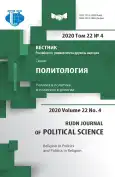European Identity between Religiousness and Secularity
- Authors: Klimova G.S.1
-
Affiliations:
- The Russian Presidential Academy of National Economy and Public Administration
- Issue: Vol 22, No 4 (2020): RELIGION IN POLITICS AND POLITICS IN RELIGION
- Pages: 617-633
- Section: RELIGION, NATION, IDENTITY: POLITICAL MEANINGS IN THE MODERN WORLD
- URL: https://journal-vniispk.ru/2313-1438/article/view/322186
- DOI: https://doi.org/10.22363/2313-1438-2020-22-4-617-633
- ID: 322186
Cite item
Full Text
Abstract
The role of religion in the structure of European identity was not on the top of agenda before the discussion of the Constitution project, but in the light of the intensive migration and Brexit this question appears to be more and more important. The issue of the interconnection between religion and European identity has several dimensions: the role of believing and belonging as well as Christianity and it forms in construction and functioning of European identity and feeling of Europeanness. The correlation analysis of Eurobarometer data (2009-2019), European Value Study (2d and 3d waves) and World Value Survey (1st-6th waves) data allows us to prove that, being secular in its roots, European identity has intense ties with religiousness. Religion appears to be a factor of European identity not within any confession, but more as a faith. Nevertheless, correlation analysis also demonstrates differences in the influence of Christian confessions on the one’s self-identification as European, which allows to look wider at the religion function in European Identity and claimed European values (mainly of secular and Enlightenment origin) in historical retrospective. This means that religion perspective not only reopens the discussion of the substance of being European, but also is one of key approaches to the urgent issues of peaceful group coexistence within European Union.
About the authors
Galina S. Klimova
The Russian Presidential Academy of National Economy and Public Administration
Author for correspondence.
Email: klimova-gs@ranepa.ru
PhD in History, Associate Professor of the Department of International Politics and Foreign Regional Studies, Vice Dean of the School of Political Studies, the Institute for Social Sciences
84, Prospekt Vernadskogo, Moscow, 119571, Russian FederationReferences
- Norton A. On the Muslim Question. Princeton: Princeton University Press; 2013.
- Delanty G. The limits and possibilities of a European identity: a critique of cultural essentialism. Philosophy and Social Criticism. 1995; 21 (4): 15-36.
- Delanty G. Models of citizenship: Defining European identity. Citizenship Studies. 1997; 1: 3: 285-303.
- Nelsen B.F., Guth J.L., Fraser C.L. Does Religion Matter? Christianity and Public Support for the European Union. European Union Politics. 2001; 2 (2): 191-217.
- Pagdem A. (ed.) The Idea of Europe: From Antiquity to the European Union. Cambridge: Cambridge University Press; 2002.
- Walkenhorst H. The Conceptual Spectrum of European Identity. Missing Link to Unnecessary Evil. Limerick Papers in Politics and Public Administration. 2009; 3: 1-22.
- Foucault M. The Archeology of Knowledge. New York: Pantheon Books; 1972.
- Berger P.L. The Sacred Canopy. New York: Garden City: Doubleday; 1967.
- Habermas J. Religion and Rationality. Essays on Reason, God, and Modernity. Cornwall: Polity Press; 2002.
- Habermas J. Religion in the Public Sphere. European Journal of Philosophy. 2006; 14 (1): 1-25.
- Casanova J. Rethinking Secularization: A Global Comparative Perspective. The Hedgehog Review. Spring-Summer. 2006; 8 (1-2): 7-22.
- Asad T. Formation of the secular: Christianity, Islam, Modernity. Stanford: Stanford University Press; 2003.
- Uzlaner D. The end of religion? The history of the secularization theory. Moscow: HSE; 2019 (In Russ.).
- Uzlaner D. Postsecular turn. How to think about religion in XXI century? Moscow: Institute E. Gaidar; 2020 (In Russ.).
- Robinson W.S. Ecological Correlations and the Behavior of Individuals. American Sociological Review. 1950; 15 (3): 351-357.
- Willaume J.-P. La sécularisation: une exception européenne? Retour sur un concept et sa discussion en sociologie des religions. Revue française de sociologie. 2006; 4 (47): 755-783 (In French).
- Casanova J. Religion, European secular identities, and European integration. In: Byrnes T.A. and Katzenstein P.J. (eds.). Religion in an Expanding Europe. Cambridge: Cambridge University Press; 2006. p. 65-92.
- Davie G. Is Europe an Exceptional Case. The Hedgehog Review. 2006; 8: 23-34.
- Davie G., Wilson E.K. Religion in European Society. In: Schewel B. and Wilson E.K. (eds.). Religion and European Society. A Primer. Hoboken: Wiley Blackwell; 2020. p. 15-31.
- Inglehart R. Cultural Evolution: People’s Motivations are Changing, and Reshaping the World. Cambridge: Cambridge University Press; 2018.
- Harrison L.E. Jews, Confucians, and Protestants: Cultural Capital and the End of Multiculturalism. Plymouth: Rowman & Littlefield Publisher, Inc; 2013.
- Huntington S.P. The Clash of Civilizations? Foreign Affairs. 1993; 7 (3): 29-30.
- Nelsen B.F., Guth J.L. Religion and the Struggle for European Union: Confessional Culture and the Limits of Integration. Washington: Georgetown University Press; 2015.
- Leustean L. The Ecumenical Movement and the Schuman Plan, 1950-54. Journal of Church and State. 2011; 53 (3): 442-471.
- Nelsen B.F., Guth J.L. Religion and the Creation of European Identity: The Message of the Flags. The Review of Faith & International Affairs. 2016; 14 (1): 80-88.
- Nelsen B.F., Guth J.L. Losing Faith: Religion and Attitudes toward the European Union in Uncertain Times. Journal of Common Market Studies. 2020; 58 (4): 909-924.
Supplementary files









